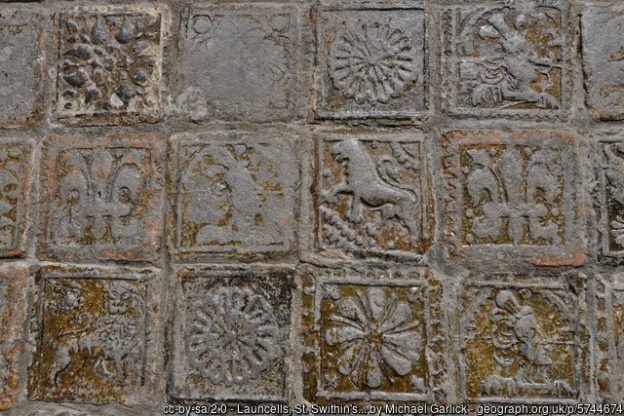It has been a while – conferencing and Covid have intervened since my last post. Here we are again, though: I’m on the mend, and ready with another cheery tale involving medieval women’s interaction with the common law. In fact this one brings together a couple of things which have interested me, over the years: petty treason (the current obsession) and an ‘old flame’ (intellectually speaking), the laws surrounding rape/ravishment and abduction in later medieval England.
The case has two distinct parts, and, as ever, it is hard to make sensible comments about the truth of any of it. What is probably true is that a ‘gentleman’ called Richard Mourton, of Southlegh in the parish of Launcells died in 1481, and he was in poor health for some time beforehand. Beyond that, who knows how he came to die, and what, if anything, was the involvement of others in his demise.
At a judicial session on 2nd October 1481, at Bodmin, twelve jurors swore that the truth went like this: Richard Mourton had been ill, and suffering physically. (Presumably knowing that this was it, and wanting to sort out the practicalities), he had appointed his wife, Matilda, and others executors of his will, custodians of his body and made a will leaving his goods and chattels to Matilda and others. He asked her for medical care. She, however, along with one William Smyth, lately of Thorne in the parish of Launcells, Cornwall, yeoman, full of evil dishonesty and seduced by the devil, and lusting to enjoy the assets of Richard sooner rather than later, took action to accelerate his demise. On 10th March 1481, William and Matilda feloniously prepared a deadly, poisonous, intoxicating drink, commonly called poysyn drynke, and gave it to Richard, passing it off as a medicine. Because Richard had great faith in Matilda and William, he drank the deceptive drink, and died on 11th March 1481 as a result. Matilda and William had, therefore, feloniously intoxicated, killed and murdered him, against the king’s peace and the crown and dignity of the king.[i]
As I said, there is no way of knowing whether this was true or not. I have found no further records relating to the death. There is, however, another layer to the story, which is to be found in the same file, on the preceding membrane.[ii] This one comes from a judicial session at Camelford on 18th April 1481, and the jurors here said that William Smyth (here described as a ‘labourer’) had carried off and raped Matilda on 23rd March 1481. The removal of Matilda from her home, and carrying off to Thorne, William’s home turf, was clearly described as being against her will. There is also a clear allegation of felonious ‘carnal knowledge’ straight afterwards. Nevertheless, the focus of the allegation is not so much the wrong to Matilda as (a) the property prospects for others; and (b) the dim view taken of Matilda’s alleged conduct after the violation. On 24th March 1481 (so the day after the rape) she was said to have ‘consented to and agreed (concorded) with him. This might conceivably mean that she settled with him, but I think it probably means that she married him, or agreed to marry him.
The jurors were keen to point out that this was a scenario dealt with in a statute of 1382,[iii] which would mean that it would affect the transmission of land (in brief, the woman would not be able to have her dower or other rights to land which would otherwise come her way). There has been quite a bit of work on this measure, often highlighting the possibility that women might run off with a lover quite consensually. They might do so, of course, but I have always been very wary of any suggestion that consensual (in modern terms) departures predominated. I think we just can’t know.[iv] This case would seem to me to reinforce the fact that violent and unwanted removal was also entirely within the contemplation of those applying this law.
Another aspect to ponder is how the two sets of allegations interacted. If they are to be believed, then the timeline was as follows:
10/3/1481 William and Matilda prepare the poison and Richard Mourton drinks it
11/3/1481 Richard Mourton dies as a result of the poisoning
23/3/1481 William abducts and rapes Matilda
24/3/1481 Matilda ‘consents and concords’ with William
18/4/1481 Session at Camelford, to which rape presentment is dated
2/10/1481 Session at Bodmin, to which poisoning presentment is dated
I am not quite sure what to make of the combined story. If there really was poisoning, should we be imagining that William and Matilda had differing views as to what should happen once Richard was out of the picture, leading to the abduction and rape of Matilda? Another possibility must be that Matilda was not involved in the poisoning, and William had plotted against both Richard and Matilda. Of course there may not have been any poisoning, ‘only’ the abduction and rape of a woman who had lost her husband less than a fortnight previously, followed by threats to her property rights.[v]
I am tempted to see the slightly belated petty treason accusation as an indication that the claim under the 1382 statute did not work. Such a failure would seem rather a good motive for somebody who stood to gain by her loss suddenly to start putting it about a few months later that Matilda had been a petty traitor (who, if convicted, would obviously not be enjoying her dower etc.) This is speculation, however, and I will have to end with a rather limp acknowledgement that the area remains intriguingly reluctant to divulge its truth.
GS
9th August, 2022.
Images: St Swithin’s Church, Launcells. For once they match the period of the case, the church having been reconstructed in the 15th C, and the fittings pictured here also coming from that century. St Swithin’s sounds an absolute cracker, with a holy well and everything. Would love to visit it!
[i] KB 9/358 m. 3; see the image via AALT here.
[ii] KB 9/358 m. 2; see the image via AALT here.
[iii] 6 Richard II, st. 1, c. 6; Statutes of the Realm II, 27.
[iv] See, e.g., my Imprisoning Medieval Women: the non-judicial confinement and abduction of women in England, c.1170–1509, (Farnham, 2011), though there is plenty of other work in this area.
[v] m.2, which describes a raid by William and others on ‘Matilda’s house’, suggests that she had initially been able to keep the house, which presumably means that there was not an immediate accusation against her.


